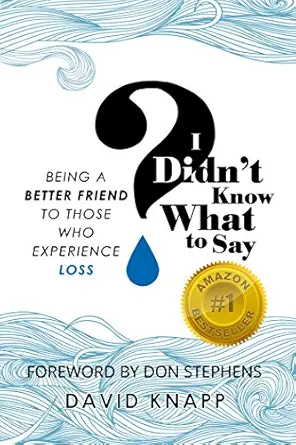
I Didn't Know What to Say: Being a Better Friend to Those Who Experience Loss
by David Knapp,Crystal Wacker Knapp
ASIN: B0112SC9AC
 UK
Buy Now
UK
Buy Now
 US
Buy Now
US
Buy Now
 CA
Buy Now
CA
Buy Now
 AU
Buy Now
AU
Buy Now
 DE
Buy Now
DE
Buy Now
 IN
Buy Now
IN
Buy Now
 FR
Buy Now
FR
Buy Now
Nobody really wants to experience loss, pain, heartache, disappointment, grief or mourning, whether it’s personal or someone else’s experience.
Commonly the dominant method of dealing with grief and loss of others is avoidance. The default ways of coping with grief or consoling the griever tend to be to change the subject, stuff it down, explain it away in an attempt to prevent grief’s symptoms, or try to get away from it quickly. Grief feels uncomfortable, so sidestepping is our first reaction and then perhaps the offer of trite condolences at best, or worse something thoughtless and unintentionally damaging.
Yet grief is best processed with the help of friends or relatives. Grief is as natural as bleeding when you cut your arm, and time and attention is needed to heal. Just as ignoring the cut can lead to infection, so too thwarted grief can cause issues in one’s life, whether evident immediately or later. Some cuts require the aid of others to properly heal.
David Knapp’s personal experience of going through the deep grieving process twice in life did more than temporarily affect him. It motivated him to become a student of what was going on in and around him. He observed how friends and colleagues reacted to the stunning loss of not just one wife to cancer, but his second wife as well, plus the early loss of his parents and other ‘life’ situations. He noted what people did and said that was helpful and what was hurtful.
The knowledge he gained from his observations and research soon drove Knapp to reach out and help others experiencing loss in ways that few had done for him. He began to see that most people, whether friends or family or in professional capacities, really did want to connect with a person in grief, but fear, ignorance or verbal clumsiness held them back. And just like First-Aid 101, there were things that could be learned.
What started as an occasional phone call turned into many requests regarding the grief process, or asking what to say and what NOT to say.
Kindly he’d explain what it was like for him during the grieving process and how he could have been helped. More than one friend admitted, “I didn’t know what to say.”
Born out of these cumulative experiences of helping his immediate family and countless unknown connections across the nation, comes his book, I DIDN’T KNOW WHAT TO SAY: Being A Better Friend To Those Who Experience Loss.
This is not a typical book on grief. Knapp’s dominant objective for writing his compelling story, interspersed throughout the book, is to help people — young or old, male or female, friend or professional — who find themselves close to a grieving individual. It is his deep desire to empower people to be better friends to the grieving.
His professional background includes many years of teaching. Readers will find that showing through as he shares practical suggestions for dealing with varying kinds of loss. For the hurried reader, there are lists that are helpful. The book offers practical insight and help on how to go through the tumultuous grieving process with others.
Chapters cover losses of pets, divorce, children (by any means), relatives and spouses. He offers helpful insight in understanding gender, cultural and religious differences of people in grief and how those factors affect what one says and does.
Those in mourning will appreciate that he does not side-step the timing of heavy grieving. Empathetically he reassures the griever that in time one can emerge a whole person ready for wherever their journey takes them next.
Grief cannot be avoided. It will knock at your door from time to time throughout your life’s journey. But you can be prepared and you can be a better friend to someone experiencing loss.

